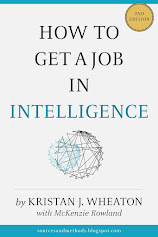The mutual fund firm, Vanguard, has an interesting interview with longtime money guru, Jason Zweig, on the impact of cognitive biases in investing. You can hear the 10 minute interview, titled Balancing Emotions And Investment Decisions by clicking on the link or you can read the transcript.
Friday, May 23, 2008
Cognitive Biases In Financial Analysis (Vanguard.com)
Posted by
Kristan J. Wheaton
at
10:15 AM
0
comments
![]()
Labels: cognitive bias, intelligence, intelligence analysis, Jason Zweig, podcast, Vanguard
New Blog On The Block (RUEE)
Prof. William McGill at Penn State has just started a blog called Risk, Uncertainty and Everything Else. His purpose behind the blog is, as he puts it on his "About" page, "to capture my thoughts and comments about various things I have found, read, seen, or heard about in relation to risk and uncertainty." He goes on to say, "this blog will keep people informed about the latest research and activities in risk and uncertainty modeling, and how it relates to security and safety risk analysis problems." So far he has a good post listing journals in the field and a more technical post talking about "Pignistic probability density functions that convey the epistemic uncertainty associated with the cumulative distribution function values for different levels of loss." And may he have many more...
Seriously, McGill is part of a new effort at Penn State to explore, as I understand it, the more technical side of intelligence analysis. As a "risk professional and methodologist" with both DOD and DHS, I expect he will try bring some rigor to the unruly data that makes up most of our input. I wish him well with his research and his blog!
Posted by
Kristan J. Wheaton
at
9:53 AM
0
comments
![]()
Labels: RUEE, William McGill
Thursday, May 22, 2008
Excellent Competitive Intel, Law Enforcement Intel, World News Mapping Resources (PolicyMap And Google Earth)
I stumbled across two good mapping resources last night. The first is actually a new service available through Google Earth. If you look at the "Layers" now available in Google Earth (in the lower left hand panel) and you check the "Gallery" box, you will discover that there is a new layer there: "Google News". Check that box and then go wherever you want to go. If Google News has picked up a story from that location, you will see a newspaper icon that you can click on to open up the summary of the story. For more information on this service, take a look at the Google Lat Long Blog.
The second mapping resource is a service called PolicyMap. It only covers the US but does a very good job of layering multiple data sets on the NavTeq mapping API. The service breaks down the data in just about any way you might want to see it: By census tract, by zip code, by Congressional District, etc. It provides good leads for business and CI professionals and Law Enforcement Intel types looking at strategic issues. For example, if I wanted to focus a marketing campaign on the retiree communities in Erie, I might want to use the map below that shows aggregated retiree income by census tract in Erie (darker colors mean more retiree income). Its just a screenshot of part of the data, though; if you want the full map, you will have to go to PolicyMap.com as the service provides no embed feature. Related Posts:
Related Posts:
NGO Intel: Southern
COOLINT Part Deux: "The World Through The Eyes Of Editors In Chief"
COOLINT: Heat Map Of Search Terms By Country
9 Great Map Resources
Terrorism Threat Map
Famine Early Warning System
Excellent African Map Source
High Priced Oil Adds Volatility To Power Scramble (NY Times)
Posted by
Kristan J. Wheaton
at
7:57 AM
4
comments
![]()
Wednesday, May 21, 2008
Can You Balance The US Budget? Can You Make Decisions Like A Chinese Official? (American Public Media And Wikiversity)
With all the brouhaha concerning DIA's recent announcement concerning the creation of several video games to help train new analysts, I thought it would be worth mentioning a couple of other "serious games" I have run across (one yesterday and one quite some time ago).
The first, Budget Hero, is a flash based game (see screenshot below) that lets you pick options to help balance the US Federal Budget. Basically, after a short intro brief, you get to pick tax and spending policies in order to try to accomplish your goals without busting the budget. Once you have selected your series of policies, the game calculates how well you have done against a couple of benchmarks and then reports back to you on how well you have accomplished your goals and how well in tune you are with others who have played the game. The game really gives you a good idea of the relative values of different policies. It also highlights the fact that some policies are important for their emotional impact but have little real impact on the total budget (By the way, if this game is at all accurate, the next administration will have its work cut out for it. The kind of answers that tend to work are not going to be very palatable). The best I have been able to do is to keep the government afloat until 2044. If anyone figures out a way to beat that, drop a comment.
The game really gives you a good idea of the relative values of different policies. It also highlights the fact that some policies are important for their emotional impact but have little real impact on the total budget (By the way, if this game is at all accurate, the next administration will have its work cut out for it. The kind of answers that tend to work are not going to be very palatable). The best I have been able to do is to keep the government afloat until 2044. If anyone figures out a way to beat that, drop a comment.
The second game is one I have been meaning to blog about for some time. One of our former students (he just graduated), Pat Noble, an analyst with the FBI, put together an interesting simulation of Chinese political decisionmaking processes called Forbidden Kingdom (he did this last year in my Advanced Analytic Techniques class so, no, there is no relation to the movie of the same name). The screenshot below shows the game board (which you have to build) and the rules and all the other materials you need are available for free over at Wikiversity. All simulations have to balance playability with realism. Pat's challenge was to make a game that captured some of the essence of modern Chinese political thinking in a short, interesting game. As someone who watched the research and development of the game, has played the game and heard countless stories about others playing the game, I think Pat accomplished just that.
All simulations have to balance playability with realism. Pat's challenge was to make a game that captured some of the essence of modern Chinese political thinking in a short, interesting game. As someone who watched the research and development of the game, has played the game and heard countless stories about others playing the game, I think Pat accomplished just that.
Posted by
Kristan J. Wheaton
at
10:37 AM
3
comments
![]()
Labels: budget, China, serious games
Tuesday, May 20, 2008
Excellent "Lesser Taught" Language Resource (DLI via DangerRoom)
Wired.com's DangerRoom featured an excellent language resource from the Defense Language Institute for some of the lesser known (only because they are lesser taught in the US) languages. Not everything on the site is accessible to non-military but the stuff that is available is very good. In addition to the fine language resources, I was particularly impressed with the "Countries In Perspective" section that provides short, descriptive country studies on about 20 countries.
Posted by
Kristan J. Wheaton
at
7:47 AM
0
comments
![]()
Labels: China, Danger Room, India, Iran, Iraq, language, Resource, Saudi Arabia, Sudan, Wired
Monday, May 19, 2008
China's Demographic Problems, India As A Counterbalance To China And A Revolution In Political Economy Against Jihad (Fora.tv)
A few recent gems from Fora.tv:
Nicholas Eberstadt: China's Looming Demographic Troubles
AEI Fellow Nicholas Eberstadt discusses the effect of an aging population on China's workforce, the skewed gender demographics and its implications, and the future of China's social capitol.
Date: Mon, 28 Apr 2008
Location: Hoover Institution, Stanford, CA,
http://fora.tv/2008/04/28/Nicholas_Eberstadt_China_s_Looming_Demographic
Mark Helprin on India Counterbalancing China
Mark Helprin answers whether India, an up and coming power in the world, will act as a counterbalance to China.
Date: Mon, 28 Apr 2008
Location: Hoover Institution, Stanford, CA,
http://fora.tv/2008/04/28/Mark_Helprin_on_India_Counterbalancing_China
A Revolution in Political Economy Against Jihad
Walid Phares calls for a revolution in political economy in the war against jihad.
Date: Wed, 23 Apr 2008
Location: Foundation for the Defense of Democracies, Washington D.C.,
http://fora.tv/2008/04/23/A_Revolution_in_Political_Economy_Against_Jihad
Posted by
Kristan J. Wheaton
at
1:11 PM
0
comments
![]()
Saying One Thing And Doing Another: A Look Back At Nearly 60 Years Of Estimative Language (Original Research)
US News and World Reports has an interesting story about the current state of intelligence reform. According to the article, CIA Director, Mike Hayden, said,
- "Some months ago, I met with a small group of investment bankers and one of them asked me, 'On a scale of 1 to 10, how good is our intelligence today?'" recalled Hayden. "I said the first thing to understand is that anything above 7 isn't on our scale. If we're at 8, 9, or 10, we're not in the realm of intelligence—no one is asking us the questions that can yield such confidence. We only get the hard sliders on the corner of the plate. Our profession deals with subjects that are inherently ambiguous, and often deliberately hidden. Even when we're at the top of our game, we can offer policymakers insight, we can provide context, and we can give them a clearer picture of the issue at hand, but we cannot claim certainty for our judgments."
Frankly, I don't know anyone knowledgeable about the strengths and weaknesses of intelligence that doesn't agree with this statement. Certitude is impossible. That is what makes the chart below so darn interesting:

The chart is from Rachel Kesselman's recently completed thesis, Verbal Probability Expressions In National Intelligence Estimates: A Comprehensive Analysis Of Trends From The Fifties Through Post 9/11. The chart shows the number of times the word "will" has been used, in an estimative sense (e.g "X will happen"), in the Key Judgments of 120 National Intelligence Estimates (NIE) over the last 58 years (20 per decade) that she examined.
In fact, at 717 times, the word "will" was the single most commonly used estimative word, by a very large margin, in NIEs. Not only was it the single most commonly used word, it was also one of the most consistently used words across the decades (tests Rachel ran showed that the variances across the decades were not statistically significant).
So...if certitude is impossible, why does the Intelligence Community use "will" -- a word that reeks of certitude -- so often in its estimates? Such a result is absolutely inconsistent with statements, such as Hayden's above, made by virtually everyone who has ever jumped up to defend intelligence's predictive track record.
This was only one of the many fascinating results that came out of Rachel's exhaustive study of the words that analysts have used over the years to verbally express probabilities
Rachel's lit review, for example, makes for very interesting reading. She has done a thorough search of not only the intelligence but also the business, linguistics and other literatures in order to find out how other disciplines have dealt with the problem of "What do we mean when we say something is 'likely'..." She uncovered, for example, that, in medicine, words of estimative probability such as "likely", "remote" and "probably" have taken on more or less fixed meanings due primarily to outside intervention or, as she put it, "legal ramifications". Her comparative analysis of the results and approaches taken by these other disciplines is required reading for anyone in the Intelligence Community trying to understand how verbal expressions of probability are actually interpreted.
Another of my favorite charts is the one below:

This chart examines the use of the NIC's nine currently "approved" words of estimative probability (See page 5 of this document for additional discussion) across the decades. The NICs list only became final in the last several years so it is arguable whether this list of nine words really captures the breadth of estimative word usage across the decades. Rather, it would be arguable if this chart didn't make it crystal clear that the Intelligence Community has really relied on just two words, "probably" and "likely" to express its estimates of probabilities for the last 60 years. All other words are used rarely or not at all.
Based on her research of what works and what doesn't and which words seem to have the most consistent meanings to users, Rachel even offers her own list of estimative words along with their associated probabilities:

Rachel's work tracks well with my own examination of word usage in recent NIEs and with some of the findings in Mike Lyden's thesis on Accelerated Analysis, but her thesis really stands on its own and my brief description and summary of some of the highlights does not do it justice. It is a first-of-its-kind, longitudinal study of estimative word usage by the intelligence community and has contributed significantly to my own understanding of where the Intelligence Community has been over the last 58 years. I think readers of this blog will be more than a little interested in her results and recommendations as well.
Related Posts:
The Revolution Begins On Page Five...
Accelerated Analysis: A New And Promising Intelligence Process
What Do Words Of Estimative Probability Mean?
Posted by
Kristan J. Wheaton
at
9:39 AM
4
comments
![]()
Labels: NIC, NIE, Rachel Kesselman, WEPs
Sunday, May 18, 2008
Great...Well, Funny, At Least...Commencement Addresses
With Commencements of all kinds in the air, I thought it would be fun to list a couple of the more "interesting" commencement addresses I have run across surfing the web:
John Stewart (2004 -- William and Mary)
Conan O'Brien (2000 -- Harvard)
Stephen Colbert (2006 -- Knox College)
Posted by
Kristan J. Wheaton
at
1:57 PM
1 comments
![]()
Labels: Commencement




